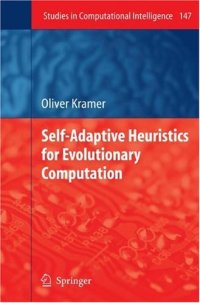
Ebook: Self-Adaptive Heuristics for Evolutionary Computation
Author: Oliver Kramer (auth.)
- Genre: Education
- Tags: Appl.Mathematics/Computational Methods of Engineering, Artificial Intelligence (incl. Robotics)
- Series: Studies in Computational Intelligence 147
- Year: 2008
- Publisher: Springer-Verlag Berlin Heidelberg
- Edition: 1
- Language: English
- pdf
Evolutionary algorithms are successful biologically inspired meta-heuristics. Their success depends on adequate parameter settings. The question arises: how can evolutionary algorithms learn parameters automatically during the optimization? Evolution strategies gave an answer decades ago: self-adaptation. Their self-adaptive mutation control turned out to be exceptionally successful. But nevertheless self-adaptation has not achieved the attention it deserves.
This book introduces various types of self-adaptive parameters for evolutionary computation. Biased mutation for evolution strategies is useful for constrained search spaces. Self-adaptive inversion mutation accelerates the search on combinatorial TSP-like problems. After the analysis of self-adaptive crossover operators the book concentrates on premature convergence of self-adaptive mutation control at the constraint boundary. Besides extensive experiments, statistical tests and some theoretical investigations enrich the analysis of the proposed concepts.
Evolutionary algorithms are successful biologically inspired meta-heuristics. Their success depends on adequate parameter settings. The question arises: how can evolutionary algorithms learn parameters automatically during the optimization? Evolution strategies gave an answer decades ago: self-adaptation. Their self-adaptive mutation control turned out to be exceptionally successful. But nevertheless self-adaptation has not achieved the attention it deserves. This book introduces various types of self-adaptive parameters for evolutionary computation. Biased mutation for evolution strategies is useful for constrained search spaces. Self-adaptive inversion mutation accelerates the search on combinatorial TSP-like problems. After the analysis of self-adaptive crossover operators the book concentrates on premature convergence of self-adaptive mutation control at the constraint boundary. Besides extensive experiments, statistical tests and some theoretical investigations enrich the analysis of the proposed concepts.